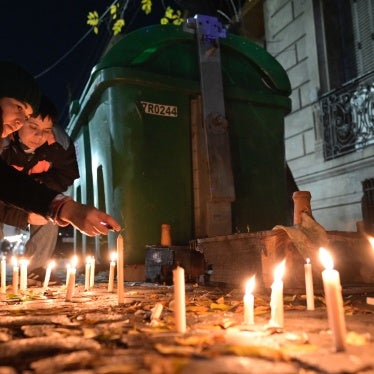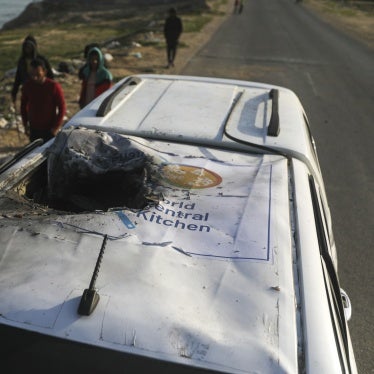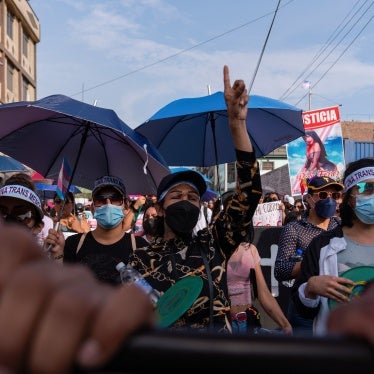Congress is right to delay consideration of the US-Colombia Free Trade Agreement (FTA). What’s at stake here is a fundamental principle: that free trade should be premised on respect for human rights, especially the rights of the workers producing the goods to be traded.
Colombian workers cannot exercise their rights without fear of being killed. Just in the first three months of this year, 17 Colombian trade unionists have been assassinated—a substantial increase over the 10 killed in the same period last year.
Many of the killings are committed by paramilitary death squads, which openly admit to deliberately targeting unionists, whom they stigmatize as collaborators of left-wing guerrillas. The New York Times this week described how a unionist was forcibly “disappeared,” burned with acid, and killed after he participated in protests against paramilitary violence last month.
Despite thousands of reported unionist killings in the last two decades, in only 68 cases has anyone ever been convicted in connection with the killings. Nearly half of those convicted have served no prison time. Others are serving dramatically reduced sentences: for example, paramilitary commander Salvatore Mancuso, who was recently convicted of ordering the killing of the two-year old granddaughter of a trade unionist, could be free by 2010 under Colombia’s “Justice and Peace Law.”
Knowing that impunity is an obstacle to FTA ratification, Colombia’s government last year established a specialized group of prosecutors to focus on trade union cases. This is a positive development with the potential to produce meaningful results - but only if the pressure is sustained. Once the deal is approved, the administration of President Álvaro Uribe will lose its main motivation for supporting the investigations. The theoretical possibility of fines or sanctions under the accord falls far short of being an adequate incentive to effective prosecution. There’s no reason to think that officials who have labeled trade unionists “terrorists” will be concerned about the plight of workers once the pressure of possible FTA rejection is off.
Meanwhile, the Colombian government has yet to get serious about breaking paramilitaries’ continuing influence, including their links to sectors of the military, intelligence, and political systems. More than 50 Colombian congresspersons, mostly from Uribe’s coalition, are under criminal investigation for collaborating with paramilitaries. But these investigations are the result of an initiative by the Colombian Supreme Court - not the Uribe Administration. While Uribe has funded the court, he has often taken steps that could undermine the investigations, lashing out against Supreme Court Justices and even, at one point, floating a proposal to let the politicians avoid prison.
Uribe administration officials often dismiss concerns about paramilitary violence by claiming that the paramilitaries are now “extinct” thanks to the government’s demobilization program. But scores of “new” groups closely linked to the paramilitaries are operating all over the country, engaging in extortion, killings, forced displacement, and drug trafficking - just like their predecessors. Eight foreign embassies in Bogota, the Organization of American States’ mission verifying the demobilization, and dozens of human rights defenders have reported receiving threats from the new groups in recent months.
I have personally interviewed victims of these new groups in remote Colombian regions like Nariño. To those who have seen their sons or sisters horrifically tortured and murdered, the government’s talk of paramilitary demobilization is a cruel joke.
Nearly all the 30,000 “demobilized” paramilitaries are free and have never been investigated. Only about 150 of them are now going through interrogations under the “Justice and Peace Law.” That law, which applies only to demobilized individuals who request it - usually because they have charges pending against them -grants them dramatically reduced sentences for all their crimes, including trade unionist killings.
Paramilitary commanders serving the reduced sentences enjoy special privileges like the use of unmonitored cell phones they can use to stay in touch with their henchmen. Unless the government shifts course, in a few years they will emerge with much of their ill-gotten wealth and influence intact.
There are many steps Colombia could and should take to address these serious problems. We outlined several of them in a letter to US Trade Representative Susan Schwab in January.
Unfortunately, instead of encouraging Colombia to take these steps, the Bush administration has been trying to ram the FTA through Congress. Now Congress has an opportunity show that it’s serious about workers’ rights by pressing Colombia to really change the pattern of violence, impunity, and paramilitary influence.
Maria McFarland Sanchez-Moreno is senior Americas researcher for Human Rights Watch.





